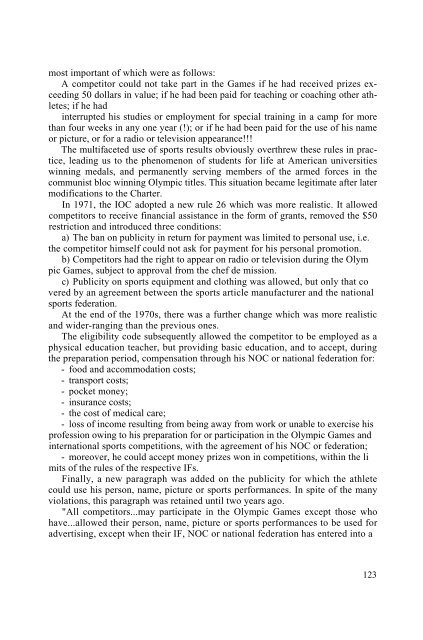Create successful ePaper yourself
Turn your PDF publications into a flip-book with our unique Google optimized e-Paper software.
most important of which were as follows:<br />
A competitor could not take part in the Games if he had received prizes exceeding<br />
50 dollars in value; if he had been paid for teaching or coaching other athletes;<br />
if he had<br />
interrupted his studies or employment for special training in a camp for more<br />
than four weeks in any one year (!); or if he had been paid for the use of his name<br />
or picture, or for a radio or television appearance!!!<br />
The multifaceted use of sports results obviously overthrew these rules in practice,<br />
leading us to the phenomenon of students for life at American universities<br />
winning medals, and permanently serving members of the armed forces in the<br />
communist bloc winning Olympic titles. This situation became legitimate after later<br />
modifications to the Charter.<br />
In 1971, the IOC adopted a new rule 26 which was more realistic. It allowed<br />
competitors to receive financial assistance in the form of grants, removed the $50<br />
restriction and introduced three conditions:<br />
a) The ban on publicity in return for payment was limited to personal use, i.e.<br />
the competitor himself could not ask for payment for his personal promotion.<br />
b) Competitors had the right to appear on radio or television during the Olym<br />
pic Games, subject to approval from the chef de mission.<br />
c) Publicity on sports equipment and clothing was allowed, but only that co<br />
vered by an agreement between the sports article manufacturer and the national<br />
sports federation.<br />
At the end of the 1970s, there was a further change which was more realistic<br />
and wider-ranging than the previous ones.<br />
The eligibility code subsequently allowed the competitor to be employed as a<br />
physical education teacher, but providing basic education, and to accept, during<br />
the preparation period, compensation through his NOC or national federation for:<br />
- food and accommodation costs;<br />
- transport costs;<br />
- pocket money;<br />
- insurance costs;<br />
- the cost of medical care;<br />
- loss of income resulting from being away from work or unable to exercise his<br />
profession owing to his preparation for or participation in the Olympic Games and<br />
international sports competitions, with the agreement of his NOC or federation;<br />
- moreover, he could accept money prizes won in competitions, within the li<br />
mits of the rules of the respective IFs.<br />
Finally, a new paragraph was added on the publicity for which the athlete<br />
could use his person, name, picture or sports performances. In spite of the many<br />
violations, this paragraph was retained until two years ago.<br />
"All competitors...may participate in the Olympic Games except those who<br />
have...allowed their person, name, picture or sports performances to be used for<br />
advertising, except when their IF, NOC or national federation has entered into a<br />
123

















